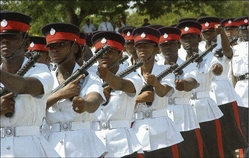Fighting crime - Are both parties on common ground?
Published: Sunday | February 8, 2009

Norman Grindley /Deputy Chief Photographer
Female constables perform a drill exercise during their passing out parade at the Police Academy, Twickhenham Park, St Catherine, in June 2006. The police have an uphill battle to fight against crime.
Daraine Luton, Staff Reporter
THE OPPOSITION People's National Party (PNP) has pledged its support to the Government's crime-fighting measures despite its strong opposition to aspects of the anti-crime bills, to be debated by Parliament shortly.
Both parties had agreed on the need for new anti-crime legislation, but the Opposition and sections of civil society have balked at some of the measures.
Now, A.J. Nicholson, leader of opposition business in the Senate and the PNP's legal adviser, says with the crime situation at crisis level, both parties will have to find common ground.
Attacking a crisis
"In times of crisis, the very first rule to attack a crisis is to attack it together," said Nicholson.
"In the best of times, it is wise that you approach public affairs seeking consensus; in a crisis, that is imperative," Nicholson added.
He said he was confident that both political parties would display the maturity needed to get the bills passed.
Nicholson's comments came days after Prime Minister Bruce Golding told a Jamaica Labour Party Area Council One meeting that the Government was prepared to reach a compromise with the Opposition on the bills.
"In relation to two of them, and perhaps the two most important ones, we have to reach agreement with the Opposition because they cannot be passed into law unless the Opposition agrees," Golding said.
Representatives of the Government and the Opposition are now in talks in an effort to agree on the bills, which have already been subject to review by a joint select committee of Parliament.
"The Opposition is not in the mode to stall anything, not on this score," Nicholson told The Sunday Gleaner.
Of the six bills, two are seeking to enact sunset clauses to existing legislation.
Among the proposed provisions is for the Bail Act to be amended to allow for the detention for up to 60 days, persons suspected of murder and shootings.
The amendment to the Parole Act proposes to impose minimum prison time for persons convicted of certain offences.
daraine.luton@gleanerjm.com
Security statistics
With a population of approximately 2.6 million, is Jamaica adequately served by law-enforcement personnel?
Auxiliaries
The penal facilities include:
Maximum security facilities include:
THE PRIVATE sector-led anti-crime initiative Crime Stop is reporting that anonymous calls to its 311 number resulted in some major arrests and seizures last year.
According to Crime Stop, in what was a very successful year of operation, information from callers led to the arrest of two persons on the country's most-wanted list.
In addition, calls to Crime Stop helped the police to arrest two persons in connection with the 2007 murders of Rohan Dixon and Dr Peter Vogel.
Crime Stop calls also resulted in the recovery or seizure of $19 million in property and $31 million in narcotics.
Rewards continued to be paid out in record numbers as $1.5 million was paid to persons whose calls produced arrests and recoveries.
Crime Stop is run under the direction of the Private Sector Organisation of Jamaica. All calls are kept in the strictest of confidence to protect the anonymity of the caller

















